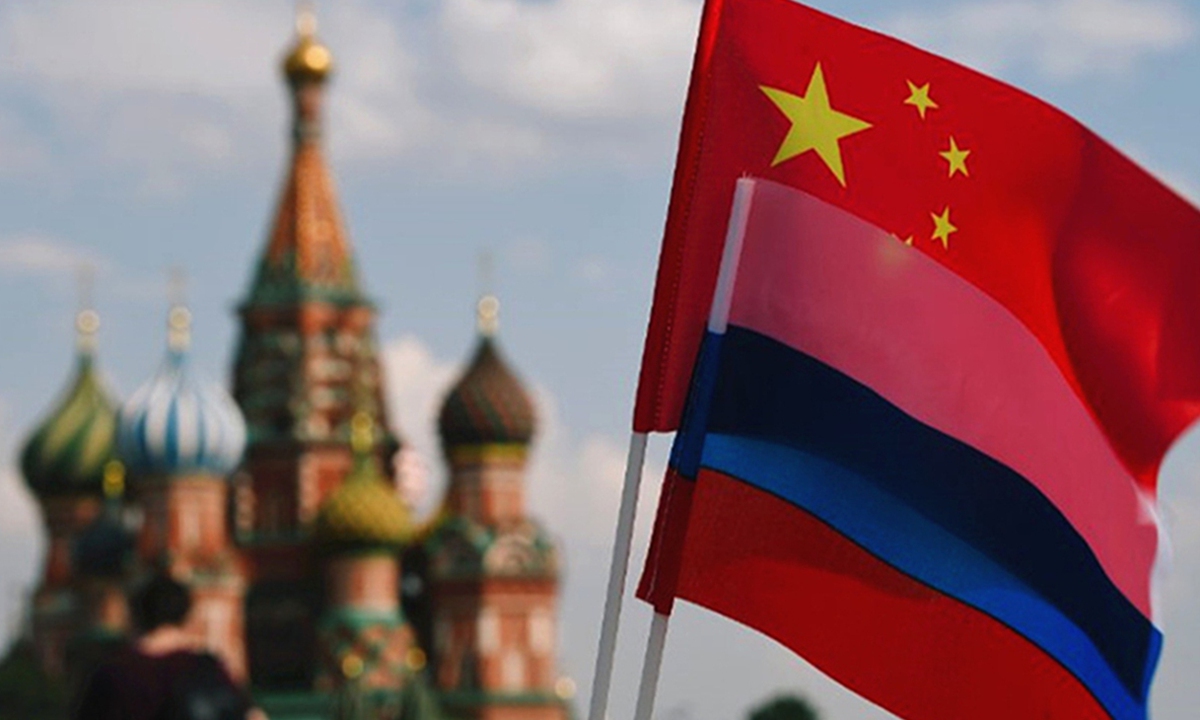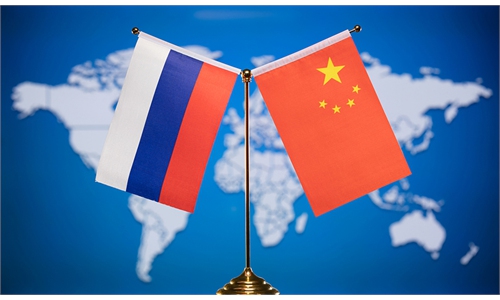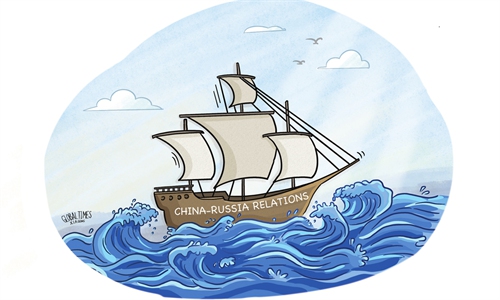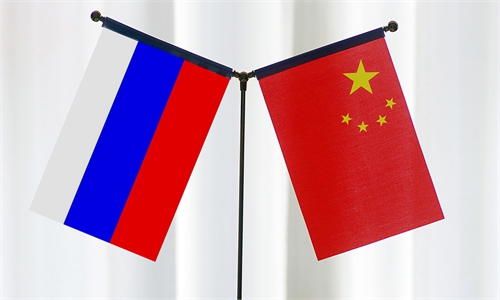Absolute tacit understanding, mutual trust between Xi and Putin provide a top-level guarantee for China-Russia relations

The national flags of China and Russia are seen on Red Square, Moscow. Photo: Xinhua
Chinese President Xi Jinping's state visit to Russia starting from Monday to Wednesday, his first official visit since being elected as President, is a testament to the importance of China-Russia relations in China's diplomatic strategy and Xi's personal friendship with Russian President Vladimir Putin.On the eve of Xi's Russia visit, the Chinese leader published an article addressing bilateral relations in a major Russian media publication, while Putin published similar comments in People's Daily. This is very rare in China's history of foreign relations, showing that China-Russia relations are exceptional for both sides.
Xi and Putin have some common views on the characterization and prospects of bilateral relations. The Chinese leader described China-Russia relations as a model of "a new model of major-country relations featuring mutual respect, peaceful coexistence and win-win cooperation," while the Russian president called the ties between the two countries "an example of harmonious and constructive cooperation between major powers."
The two heads of state share a similar view on their countries' relationship, reflecting the tacit understanding and mutual trust the two leaders have accumulated over some 40 formal and informal meetings. The personal friendship between them and their consensus on the future of China-Russia relations provides a top-level guarantee for the stable and healthy development of bilateral ties.
For Russia, which is currently under the full siege of the Western camp, Xi's visit undoubtedly sends a clear political message to it and the rest of the world: China will not change its independent foreign policy because of the Western countries' attitudes, and will not abandon its long-standing partners in mutual support and cooperation.
On the first anniversary of the Russia-Ukraine conflict in February, US President Joe Biden's visit to Kiev set the tone for the Western camp's continued support for Ukraine. The West continues to provide Ukraine with large sums of aid despite their dire financial situation at home. On Friday, the International Criminal Court issued an arrest warrant for Putin, charging him with "the unlawful deportation of children and the unlawful transfer of children to Russia." All these moves show that the Western camp has completely abandoned the possibility of talks with Russia and regarded the Putin administration as an ideological enemy.
While the confrontation between Russia and the West continues to escalate in Europe, Russia strives for a breakthrough in Asia. Since the outbreak of the Russia-Ukraine conflict, Russia has been excluded from the Western-led industrial and technological chains. It has become closer than ever to non-Western countries such as China, India, Iran, and other ASEAN members.
However, India and Iran can only provide limited help as they have smaller economies and possess weaker technological innovations. Moreover, the two countries lack the ability to disregard external interference and adhere to an independent foreign policy.
By contrast, China has a complete industrial chain and technological capabilities in most industries to provide materials and equipment to a partner in dire need. Therefore, China can offer Russia the biggest help in breaking through its current Western siege.
To this end, Xi's visit to Russia is expected to boost all-around cooperation.
First, the China-Russia relationship is a fresh force against the Western camp's ideological demarcation and Cold War mentality. Beyond the "zero-sum" mentality of the Western countries, China and Russia offer an example of a new type of relationship between great powers; one that is not based on ideological demarcation and is not directed at third parties, but is pursuant to safeguarding people's welfare. It is perhaps the most valuable and scarce intellectual asset in the current world.
Second, China and Russia will further advance pragmatic cooperation, dovetail the Belt and Road Initiative with the Eurasian Economic Union, jointly maintain the stability of industrial and supply chains, as well as restore the global cycle that has been undermined by the Western camp. Dividends from the development of the China-Russia bilateral cooperation will also benefit countries in the region, including those in Central and Northeast Asia.
Furthermore, China is a powerful stabilizer in Eurasia in containing the incitement of foreign powers and mounting terrorism, thus guaranteeing regional stability and peace in the region. Since 2022, although Pakistan and Sri Lanka have encountered great difficulties in domestic development, the overall situation in Eurasia has remained positive, compared to the surge of confrontation and internal conflicts in Europe. We even see the reconciliation of long-standing enemies like Iran and Saudi Arabia.
Xi's visit to Russia will be a highlight in China-Russia relations, which provides some certainty and hope for the world undergoing major changes unseen in a century.
The author is an assistant research fellow from the Center for Russian Studies of East China Normal University. opinion@globaltimes.com.cn



